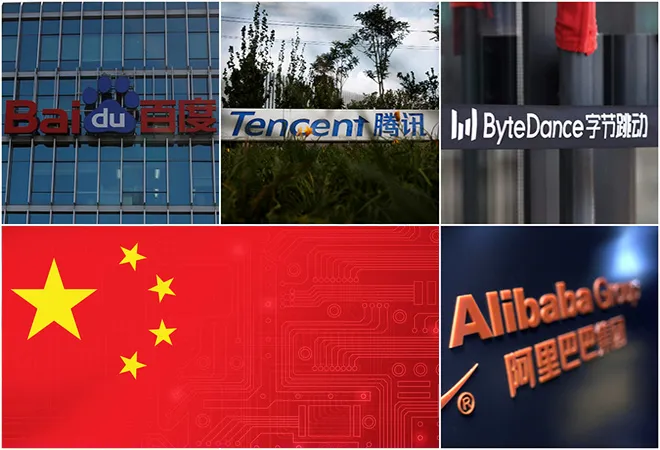
Since the onset of the COVID-19 pandemic, digital technology has become crucial as medical consultations, tutoring, professional work, essential shopping, payments, entertainment, etc. have shifted online. It reinforced the role of tech in the modern lifestyle in a compressed timeline. It is no surprise then that technology firms hold
seven spots among the top 10 most valued brands in the world. Despite lightning innovation, a few Big Tech companies that got a head start to dominate the technology sector, often through predatory practices, have gathered remarkable clout as users heavily rely on them for their daily acitivities.
Tech companies prefer a liberal market economy which gives them autonomy, whereas China favours a statist model—or as many would call it, “state-led capitalism”—which is efficient but puts governmental guidance and command at the core.
Regulators and politicians around the world are concerned about the ‘move fast and break things’ business model of tech firms. They agree that Big Tech hoard data, abuse their suppliers, exploit gig workers and try to build a monopoly. There has been a push towards more robust rules for fair competition as well as protection of consumer data and privacy globally. Although democracies like the
US,
EU,
India,
Australia, and
Brazil have been working on regulating Big Tech for some time now, they are still struggling to formulate effective policies. “Authoritarian” China, the proponent of “internet sovereignty”, on the other hand, unveiled a sweeping overhaul of its tech sector in a short time. It was possible because of a fundamental difference between the two governance models. Tech companies prefer a liberal market economy which gives them autonomy, whereas China favours a statist model—or as many would call it, “state-led capitalism”—which is efficient but puts governmental guidance and command at the core.
China’s cyberspace laws and regulatory bodies
China had a plan, i.e., the Golden Shield Project, also known as the Great Firewall, in place to monitor cyberspace long before the internet became popular among common households. A few years later, China blocked a large chunk of foreign players from entering its digital space. Such favourable conditions boosted the growth of home-grown tech titans. But things are changing under the current regime. Xi Jinping came to power the same year Edward Snowden became the whistle-blower on
widespread NSA surveillance. The very next year, he formed the Cyberspace Administration of China (CAC). In his address at
the very first meeting of the CAC, President Xi said, “There is no national security without cybersecurity, and there is no modernisation without digitalisation.” In the following years, he further strengthened the regulatory infrastructure before the showdown with Big Tech. A
Cybersecurity Law was passed in 2016, which stipulated network operators to store select data within China and allowed Chinese authorities to conduct spot-checks on a company’s network operations. In 2017, the
National Intelligence Law, which states that “any organisation or citizen shall support, assist and cooperate with the state intelligence work per the law” was passed. The
Data Security Law focusing on data handling, which clarifies the responsibilities of government, enterprises, social groups, and operators in assuring data security, was passed in June 2021. This law came into effect on September 1, 2021. The
Personal Information Protection Law was passed on August 20, laying out a comprehensive set of rules around data collection. Combined, they form a legal framework for data and information security.
China blocked a large chunk of foreign players from entering its digital space. Such favourable conditions boosted the growth of home-grown tech titans. But things are changing under the current regime.
The recent crackdown on Big Tech also comes under the ambit of the anti-trust probe. China had an anti-monopoly law in effect from 2008, but implementation in the tech sector gained momentum only after the
formation of the State Administration for Market Regulation (SAMR) in 2018. The SAMR, along with other super agencies, (for example, the Administration consolidates in one ministry the market regulation functions previously shared by three separate ministries—the General Administration of Quality Supervision, Inspection and Quarantine (AQSIQ); the China Food and Drug Administration (CFDA); and the State Administration of Industry and Commerce (SAIC)), were created under the “State Council Institutional Reform Program” to eliminate the grey zone between different watchdogs. The formation of the
China Banking and Insurance Regulatory Commission (CBIRC) streamlined efforts to spot the bubble of unchecked fin-tech businesses. Last November, authorities issued
draft amendments to the Anti Monopoly Law that are expected to go into effect this year. Under the new rules, these violations could incur fines as high as 10 percent of the disciplined firm’s revenue from the previous year.
China’s anti-monopoly and anti-trust measures
The eleventh-hour
halt on the mega IPO of Ant group, founded by Jack Ma, marked the launch of a major crackdown on the tech sector. In a
statement, Ant apologized to the investors and pledged cooperation with the authorities on regulatory issues. Alibaba also stated the support of its sister company. SAMR
initiated an anti-trust probe into tech companies, including Tencent, Baidu, Didi Chuxing, and a ByteDance-backed firm in the following months.
Alibaba was fined a record US $2.75 billion for anti-monopoly violations. Bloomberg
reported that authorities are planning to slap a US $1billion anti-monopoly fine on Meituan, China’s food delivery giant. In 22 other cases related to non-compliance,
SAMR fined the violators US $77,000 each, including six companies owned by the Alibaba Group, five by Tencent Holding Ltd., and two by retailer Suning.com Ltd.
The eleventh-hour halt on the mega IPO of Ant group, founded by Jack Ma, marked the launch of a major crackdown on the tech sector.
In May this year, the CAC announced that it would strengthen oversight of
unruly online fan groups. In July, it
fined Alibaba's e-commerce marketplace Taobao, Tencent's QQ messaging service, live-streaming site Kuaishou, microblogging platform Sina Weibo and social media and e-commerce service Xiaohongshu for spreading child-related obscene content. SAMR ordered Tencent to
give up its exclusive music rights. It also ordered Tencent and 13 other companies to
fix “harassing” pop-up windows. SAMR blocked a merger of US-listed Huya and Douyu, the two biggest video game live-streaming sites in China. It
said that the combined platform of Huya and Douyu could have 80-90 percent of the domestic market share, which would not be conducive to fair market competition as it will strengthen Tencent’s dominant position in the video game live-streaming market.
In the same month, China’s ubiquitous ride-hailing app Didi was
taken off the app store and new registrations were suspended days after its US $4.4 billion public listing on the grounds of being a “cybersecurity risk”. On July 16, an on-site cybersecurity review of Didi was initiated by
seven government agencies, including the Cyberspace Administration of China, the public security ministry, and the national security ministry, following which its shares dropped about 25 percent since its market debut on the New York Stock Exchange. Shares of
other US-listed Chinese tech firms also took a dip. After Didi, CAC
initiated a cybersecurity probe into U.S.-listed Boss Zhipin, an online recruitment platform backed by Tencent and subsidiaries of Full Truck Alliance, a road logistics firm. It has recently asked
car makers to store data locally. This is not something new.
Apple which boasts privacy features all over the world had to come to terms with China’s new data regulations.
China’s ubiquitous ride-hailing app Didi was taken off the app store and new registrations were suspended days after its US $4.4 billion public listing on the grounds of being a “cybersecurity risk”. On July 16, an on-site cybersecurity review of Didi was initiated by seven government agencies.
The flourishing
ed-tech sector became the latest victim of a sweeping regulatory overhaul of the tech sector last month. The Double Reduction Policy stipulates that companies teaching subjects covered in primary and middle school cannot be for-profit. No new private tutoring firms can register while existing online education platforms need to seek fresh approval from regulators despite their previous credentials. They are also banned from raising capital, going public. It is a hard blow to China’s K-12 after-school training business that was earlier
expected to reach RMB 1.4 trillion in 2025. It did not only send shockwaves through China's $120 billion private tutoring sector but also triggered a
massive sell-off in the shares of U.S.-listed TAL Education Group and Gaotu Techedu.
Being the top two valuable companies of China, Alibaba and Tencent have become the prime target of the current crackdown. Top executives of many tech companies, including the boss of Alibaba – Jack Ma and CEO of Tencent – Pony Ma, were summoned by regulators to conduct self-examination. Surprisingly, few tech tycoons have also abruptly announced their retirements, such as Pinduoduo’s Colin Huang, Bytedance’s Zhang Yiming, and real estate major Soho Group’s Pan Shiyi and Zhang Xin. Alibaba, Tencent, Didi, and seven other tech giants
issued public pledges to obey anti-trust laws. The overall response of all the tech firms under scrutiny is utterly submissive, unlike their foreign counterparts.
Top executives of many tech companies, including the boss of Alibaba – Jack Ma and CEO of Tencent – Pony Ma, were summoned by regulators to conduct self-examination. Surprisingly, few tech tycoons have also abruptly announced their retirements.
Amidst the ongoing turmoil, many tech firms have reportedly
shelved their foreign IPO intentions after the CAC rolled out a
new policy draft stipulating mandatory security review for any domestic company with more than 1 million users seeking to list on public markets overseas. China has tightened data regulations for other companies as well. New documents from China’s State Council and the Chinese Communist Party’s Central Committee indicate that the
crackdown will continue. Cyberspace Administration of China and China Securities Regulatory Commission are now aiming
for online stock manipulators. Reuters
reported, CBIRC plans to step up scrutiny of online insurance companies. The current wave of the crackdown has unnerved investors in
the healthcare sector. It is a matter of time to see what’s next - gaming, advertising, real estate, or something else.
Financial stability, ideology, power-play within the CPC, geopolitics, and social challenges have led to a speedy crackdown on tech giants. The subsequent article covers these aspects in detail. The comprehensive analysis of the reasons provides insights into the tech future that the party wants to achieve.
The views expressed above belong to the author(s). ORF research and analyses now available on Telegram! Click here to access our curated content — blogs, longforms and interviews.



 Since the onset of the COVID-19 pandemic, digital technology has become crucial as medical consultations, tutoring, professional work, essential shopping, payments, entertainment, etc. have shifted online. It reinforced the role of tech in the modern lifestyle in a compressed timeline. It is no surprise then that technology firms hold
Since the onset of the COVID-19 pandemic, digital technology has become crucial as medical consultations, tutoring, professional work, essential shopping, payments, entertainment, etc. have shifted online. It reinforced the role of tech in the modern lifestyle in a compressed timeline. It is no surprise then that technology firms hold  PREV
PREV


